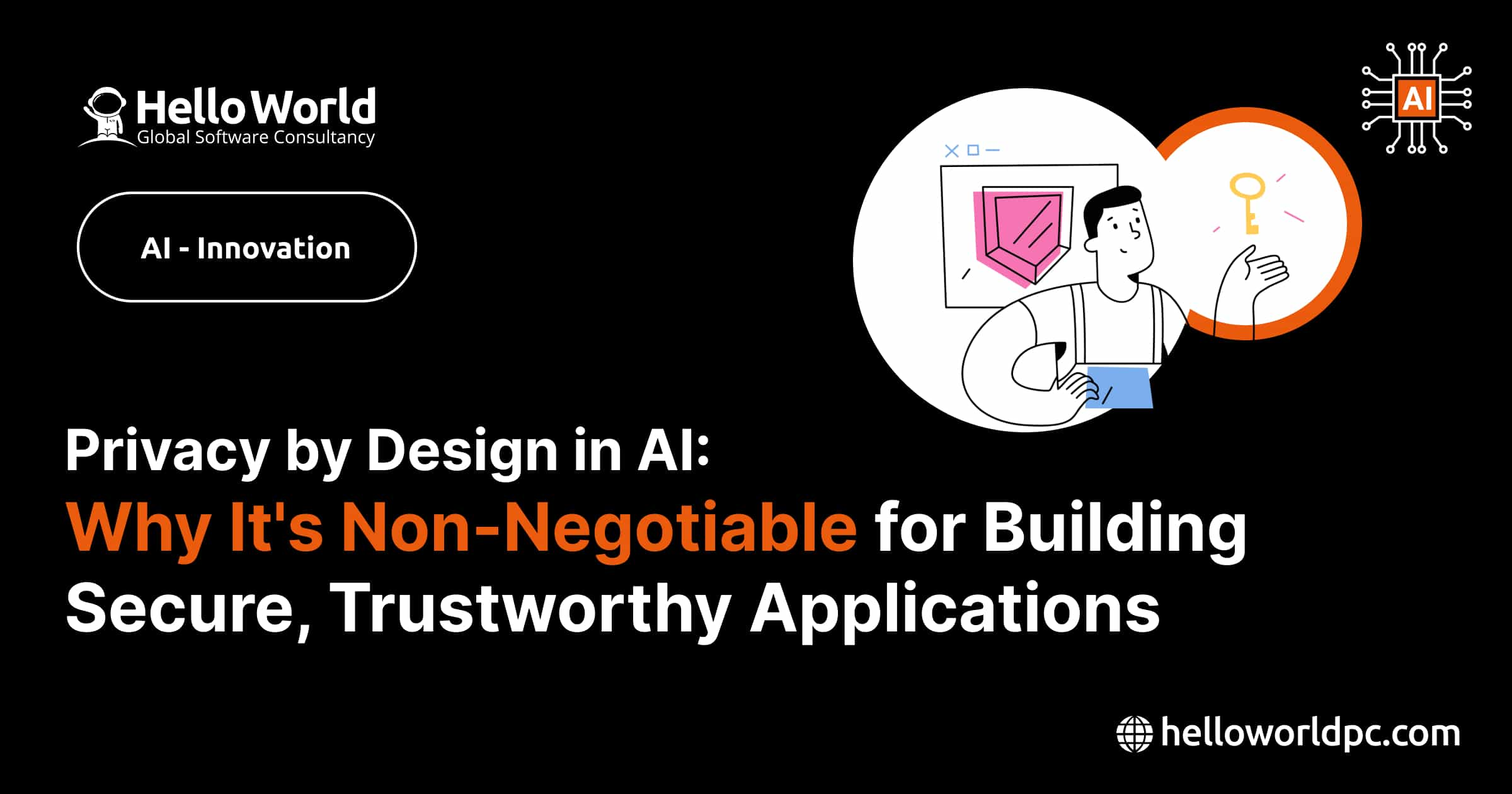The concept of Privacy by Design (PbD) is no longer a nice-to-have—it's an essential framework that every IT firm must embrace, especially when building AI-powered applications. At HelloWorld PC, we take this principle seriously because we believe that security and trustworthiness form the foundation of any impactful product.
That said, let's see what is Privacy by Design in the first place and why it should be a priority for all IT firms especially for the ones who build AI applications that interact with sensitive data.
What is Privacy by Design?
Privacy by Design is a framework that ensures privacy is integrated into the entire lifecycle of an application or system—from the initial design phase to deployment and beyond. It's not something that gets tacked on at the end but is baked into the system's architecture. This approach is even more critical in the AI space, where sensitive data processing is central.
Key Principles of Privacy by Design in AI
-
Data Minimization
One of the core principles we follow is collecting only the data necessary for the AI system's functionality. In an AI-based CV processing app, for instance, we have to ensure that we don't extract or retain more information than needed. This minimizes the risk of exposure and ensures compliance with data protection regulations. -
End-to-End Security
AI applications, especially those involving sensitive user data, are built with encryption mechanisms at every touchpoint. This means that whether data is in transit or at rest, it is fully protected. For example, this is essential for e-commerce recommendation engines since user purchasing behaviors and preferences are valuable assets that need safeguarding. -
Transparency and User Consent
Transparency is critical in gaining user trust. All AI applications should include clear privacy policies and user consent mechanisms. Before processing CVs or analyzing customer behaviors, users should know how their data will be used and stored and for how long. -
User Control and Access
Modern platforms should allow users to access, modify, and delete their data whenever they choose. Again, in a AI-assisted e-shop recommendation systems, users should have control over their preferences, ensuring they feel secure about handling their data. -
Privacy as the Default Setting
From day one, AI applications should be configured to prioritize privacy. By default, the systems are designed to use the most minor personal data possible and anonymize it where necessary. Modern applications should not rely on user intervention to turn on privacy features—these should be built already into the core functionality. -
Continuous Monitoring and Auditing
Privacy isn't a one-time effort; it's a continuous process. Teams who build AI applications should regularly audit their systems to ensure compliance with the latest privacy laws, such as the GDPR. Automated tools should monitor data flow within AI models to detect potential privacy violations in real-time, allowing teams to act swiftly if something goes wrong.
Why Privacy by Design is Crucial for IT Firms
In a world where data breaches and privacy concerns make headlines regularly, the importance of PbD cannot be overstated. For IT firms like ours, Privacy by Design serves as a legal safeguard and strategic advantage. Here's why it matters:
-
Trust and Reputation
AI applications often deal with sensitive data, and any mismanagement can lead to a loss of trust. By prioritizing PbD, we build applications that users can trust, which strengthens our brand and reputation. -
Regulatory Compliance
With evolving privacy laws like GDPR and CCPA, non-compliance can lead to hefty fines and legal challenges. Designing AI systems with privacy in mind ensures we meet these regulations effortlessly. -
Future-Proofing
The AI landscape is changing rapidly, and privacy regulations will likely evolve too. By building privacy-first applications, we future-proof our systems against upcoming legal and ethical challenges, ensuring that our products remain relevant and compliant in the long run. -
Competitive Advantage
Privacy is a growing concern for users. Companies that take data protection seriously have a competitive edge in attracting customers and clients. By making PbD a core principle, such firms will position themselves as leaders in secure AI development.
Final Thoughts
At HelloWorld PC, Privacy by Design is more than just a buzzword—it's a guiding principle that drives every phase of our AI development. By embedding privacy into the heart of our applications, we ensure that we ship products that are not only innovative but also secure and trustworthy. In today's privacy-conscious world, adopting such practices is no longer optional but essential for any IT firm that aims to deliver meaningful, impactful solutions.
Ensuring user privacy is the key to building long-lasting trust and establishing a solid foundation for future growth. Whether AI-based CV processing, e-commerce systems, or customer relationship management, the privacy-first approach guarantees the best outcomes for the user and the developer. Cheers!!

